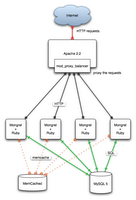Update 2007-06-04: Visit www.deprec.org

Until now, installing a full Rails stack on Ubuntu linux and deploying your app took more than a few minutes. The first time I tried it took hours. Even copying and pasting from my notes took forever.
Now with deprec (deployment recipes for Capistrano) you can install a rails stack and deploy your application with just 6 commands.
cd /path/to/railsapp
deprec --apply-to . --name projectname --domain www.projectname.com
# edit config/deploy.rb to put in details of your subversion repository
cap install_rails_stack
cap deprec_setup
cap deploy_with_migrations
cap restart_apache
That's all it takes to get your Rails app running on a default Ubuntu 6.06 server install. Install the gem with:
sudo gem install deprec -y # installs what you need
deprec_dotfiles # patches capistrano + creates your ~/.caprc
cap show_tasks # now you have deprec tasks included
I'll be putting more details up soon on
deprec.rubyforge.orgDeprec was inspired and uses the brilliantly executed Capistrano. Thanks Jamis!
After starting on this project I found myself reading and utilizing a lot of
code by Bradley Taylor, in particular the RailsMachine and VMbuilder gems.
Neil Wilson wrote three capistrano plugins that are used in this project.
I'd like to say a huge thanks to these guys for helping make my work easier!


